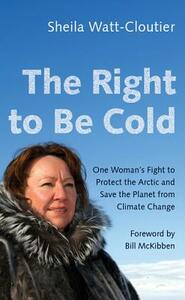Take a photo of a barcode or cover
informative
inspiring
slow-paced
emotional
informative
inspiring
reflective
medium-paced
Loved it. I learned a lot from this book and marveled at the precise concision of the language. As a biography, this might leave readers wondering after more personal details, but I enjoyed the political elements of Watt-Cloutier's historic interventions into POPs and human rights at the international level.
I thought this would focus more on climate change, but it is really a memoir just of her life. The first third was about her growing up and experiencing living in an Inuit community, but born to an unknown white father (her maternal grandfather was also white and didn't stay in the community). That part was interesting for what it was. Also interesting to hear her work to try and bring attention to how climate change is affecting the northern communities and people, not just the planet. But I disagreed with some of her arguments as she focused solely on making profit for the people, but didn't discuss how the growing population cannot sustain itself if they're allowed to fish and hunt as much as they please and offer tourist hunting to trophy hunters etc. It's not only climate change affecting the amount of wildlife. If you want to maintain good ways of life for the community you need to mix tradition with new opportunities in a way that can continue for years to come.
challenging
hopeful
reflective
sad
Sheila Watt-Cloutier has done a great deal of critical work in bringing global attention to the many detrimental environmental and cultural changes that have occurred in the Arctic in the past 50 years. She has done a great deal of work, for instance, to frame climate change and melting Arctic ice as a human rights issue as well as an environmental one. For this reason, I believe the book should be read by all North Americans who are concerned about the environmental impacts of losing the Arctic's snow and ice. The book tends to meander in places, and can sometimes be repetitive, but the information and ideas discussed are both critical and global.
3.5 only because the later part has SO MUCH detail it is overwhelming to the general reader
The Right To Be Cold is Sheila Watt-Clouier's biography, concentrating on her life's work to protect the Inuit culture and the Arctic. She is inspiring and courageous.
She shares her story of growing up in Nunavik, learning her people's traditional way of life, hunting and preparing 'country food'. Young people were taught how to survive in the harsh climate. Igloos were stronger than tents and offered protection from both weather and polar bears. Sled dogs were smart and capable and reliable.
Then she was sent to the 'South' for her education and was exposed to modern, Western life. She lost fluency in her native language.
Returning to her Arctic home she became involved in education. She saw how Southern colonialism was destroying her people's culture, resulting in a rise of addiction and suicides.
Sheila became an activist for her people, first in education and culture preservation, and later in environment and climate change. The warming of the Arctic, caused by Southern use of fossil fuels, also means the destruction of her people's way of life, the animals they depend upon, and the very land they live on. Her efforts to link climate change to human rights earned her consideration for the Pulitzer Prize--lost that year to Al Gore.
Sheila's childhood memories offer a great understanding of her native culture, and her early experience in the South informs readers how traditional knowledge is lost. Her chapters on her activism and achievements are detailed and sometimes overwhelming; I can't imagine how she maintained the energy and strength to do what she has done.
I received a free ebook from the publisher through NetGalley in exchange for a fair and unbiased review.
The Arctic is the world’s air conditioner and if we cannot protect the Arctic than we are all doomed to face the effects of climate change.
Review at The Pluviophile Reader: http://bit.ly/2nXPwFY
3/5 stars.
ebook, 263 pages.
Read from March 14, 2017 to March 22, 2017.
This is the last book I tackled in the Canada Reads 2017 shortlist. I happy to have all five of the book read and reviewed before the debates take place starting on March 27th. This is the one non-fiction submission in the shortlist and while it was not my favourite book the content of the book is a warning that we should all heed.
Sheila Watt-Cloutier was born in Kuujjuaq, Nunavik to an Inuk mother and a white father. Her book recalls fond memories of country foods included seal, whale and caribou, as well as dog sledding trips, and hunting. She was shortly shipped off to Southern parts of Canada as per government regulations for schooling. As she got older she saw how the environmental and cultural changes were taking a massive toll on the Inuk people. Their whole life was be altered against their will and they were not adapting to the changes well. After failing to become a doctor, Sheila became involved locally and internationally in helping improve the way of life for her people. While not initially meaning to be an environmentalist, it became clear that the biggest problem facing her people was climate change.
Persistent organic pollutants (POPs), from around the world settle and find their way to the coldest points on earth. These pollutants poison animals and contaminate the food the the Inuks eat which inadvertently poisons them. Climate change is a real and is being seen in Arctic first. The Arctic is the world’s air conditioner and if we cannot protect the Arctic than we are all doomed to face the effects of climate change. Sheila’s book is memoir, but it is really more of warning of what is to come if we do not take action. She goes through heartbreaking details of the suffering that her people have had to endure at the selfishness of others and is looking for justice and help, not only for her own people, but to ensure that the rest of the world is protected.
Shelia has been given numerous awards and accolades for her work, including a nomination for the Nobel Peace Prize in 2007 along side Al Gore. For a full list of her awards and honours, click here.
The information in this book is undoubtedly valuable and of extreme importance, however I didn’t sign up to read and poorly delivered essay full of committee meeting details. Portions of the book became tedious with this type of detail and detracted from the important message that Sheila was trying to portray. As an editor, I would have focused on the emotional specifics of Sheila’s upbringing and the outcomes of the current climate situation for the Inuks. While it is important to recognize the extensive councils and impacts that Shelia has had, her novel is bogged down with political nuances that don’t add to her cause.
Is this “the is the one book that Canadians need now?” In terms of the cause, absolutely. This type of issue needs to be laid out for everyone to see. Just because you may not be suffering the effects of climate change at this time, it doesn’t mean that others are not and we need to do our part to get a handle on the climate change situation. However in terms of the readability of this book, I would say no.
I would still recommend this book for anyone that doubts or needs more information about climate change and especially for those who have little understanding of the ways different people live their lives.
Review at The Pluviophile Reader: http://bit.ly/2nXPwFY
3/5 stars.
ebook, 263 pages.
Read from March 14, 2017 to March 22, 2017.
This is the last book I tackled in the Canada Reads 2017 shortlist. I happy to have all five of the book read and reviewed before the debates take place starting on March 27th. This is the one non-fiction submission in the shortlist and while it was not my favourite book the content of the book is a warning that we should all heed.
Sheila Watt-Cloutier was born in Kuujjuaq, Nunavik to an Inuk mother and a white father. Her book recalls fond memories of country foods included seal, whale and caribou, as well as dog sledding trips, and hunting. She was shortly shipped off to Southern parts of Canada as per government regulations for schooling. As she got older she saw how the environmental and cultural changes were taking a massive toll on the Inuk people. Their whole life was be altered against their will and they were not adapting to the changes well. After failing to become a doctor, Sheila became involved locally and internationally in helping improve the way of life for her people. While not initially meaning to be an environmentalist, it became clear that the biggest problem facing her people was climate change.
Persistent organic pollutants (POPs), from around the world settle and find their way to the coldest points on earth. These pollutants poison animals and contaminate the food the the Inuks eat which inadvertently poisons them. Climate change is a real and is being seen in Arctic first. The Arctic is the world’s air conditioner and if we cannot protect the Arctic than we are all doomed to face the effects of climate change. Sheila’s book is memoir, but it is really more of warning of what is to come if we do not take action. She goes through heartbreaking details of the suffering that her people have had to endure at the selfishness of others and is looking for justice and help, not only for her own people, but to ensure that the rest of the world is protected.
Shelia has been given numerous awards and accolades for her work, including a nomination for the Nobel Peace Prize in 2007 along side Al Gore. For a full list of her awards and honours, click here.
The information in this book is undoubtedly valuable and of extreme importance, however I didn’t sign up to read and poorly delivered essay full of committee meeting details. Portions of the book became tedious with this type of detail and detracted from the important message that Sheila was trying to portray. As an editor, I would have focused on the emotional specifics of Sheila’s upbringing and the outcomes of the current climate situation for the Inuks. While it is important to recognize the extensive councils and impacts that Shelia has had, her novel is bogged down with political nuances that don’t add to her cause.
Is this “the is the one book that Canadians need now?” In terms of the cause, absolutely. This type of issue needs to be laid out for everyone to see. Just because you may not be suffering the effects of climate change at this time, it doesn’t mean that others are not and we need to do our part to get a handle on the climate change situation. However in terms of the readability of this book, I would say no.
I would still recommend this book for anyone that doubts or needs more information about climate change and especially for those who have little understanding of the ways different people live their lives.
emotional
hopeful
informative
inspiring
medium-paced
Again this is a book that makes you think so much work and advocacy is being done and yet we still are continuing practices that are detrimental to the Earth. Reading her story was inspiring and emotional. The loss of the Arctic has more cultural and environmental significance than most people realize, this book was eye opening to the significance of land to the people who historically have inhabited it. Our connection to place is integral to conservation.


